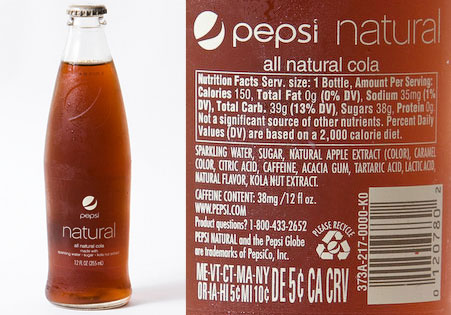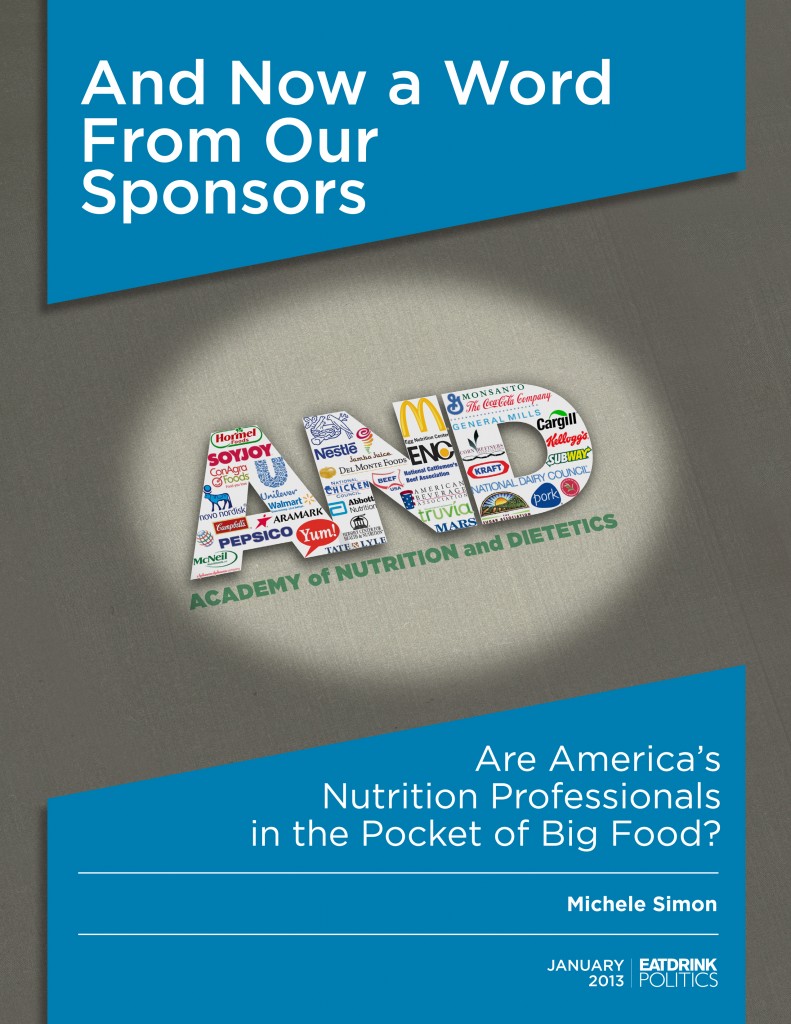
BLOG
Posted on Monday, July 22nd, 2013 by Michele Simon

Nutrition Facts for Land O Lakes “Fresh Buttery Taste” Spread
Serving Size: 1 tbsp (14g)
Amount Per Serving
Calories 70
Calories from Fat 70
Total Fat 8 g 12%
Saturated Fat 2 g 10%
Trans Fat 0 g
Ingredients: Liquid Soybean Oil, Water, Partially Hydrogenated Soybean Oil, Buttermilk*, Hydrogenated Soybean Oil, Contains Less Than 2% of Salt, Hydrogenated Cottonseed Oil, Cream*, Distilled Monoglycerides, Soy Lecithin, Potassium Sorbate (Preservative), Lactic Acid, Natural and Artificial Flavor, Vitamin A Palmitate, Beta Carotene (Color).
Short Answer: Because FDA says it’s OK to lie to you.
Labeling is one of the more complex areas of food law, full of statutes, regulations, exemptions, and exceptions. In 1990, Congress updated food labeling law with the Nutrition Labeling and Education Act, which gave the Food and Drug Administration authority to require specific types of nutrition labels on most food products. The handy Nutrition Facts panel you see on foods today displaying calorie, carbohydrate, fat, protein, and other nutrient amounts is the result of FDA implementing this law.
Continue reading →
Posted in Ask a Food Lawyer, Food Policy | Tagged: deceptive health claims, FDA, junk food, nutrition labeling | Michele on Google+ | View/Add Comments (5)
Posted on Thursday, July 11th, 2013 by Michele Simon

Short answer: Next to nothing.
With the nation finally waking up to the sad reality that truly healthy food doesn’t come in a box, food manufacturers are desperate to keep shoppers fooled into thinking highly processed food products are good for them. How do companies get away with this? Because the federal government lets them.
But it’s not for a lack of trying.
Continue reading →
Posted in Ask a Food Lawyer, Food Law, Food Policy | Tagged: FDA, natural, nutrition labeling, PepsiCo, USDA | Michele on Google+ | View/Add Comments (5)
Posted on Wednesday, July 10th, 2013 by Michele Simon
By Michele Simon and Andrew Kimbrell
You may have noticed the impressive grassroots movement gathering steam lately over the labeling of genetically engineered (GE) foods. Recently, Connecticut became the first state in the nation to enact a law to require such labels, and 26 other states have introduced similar bills this year. Millions of Americans are demanding more transparency in the food supply and our elected officials are finally responding, after decades of work by groups like Center for Food Safety. But one advocacy group, Center for Science in the Public Interest (CSPI), often seen as a leader in nutrition policy, stands virtually alone in its continued opposition to labeling GE foods. This stance is troubling and confusing given how outspoken CSPI has been for decades on food labeling and consumer information.
Read rest at Center for Food Safety.
Posted in Big Food, Food Law, Food Policy, Food Safety | Tagged: California Prop 37, Center for Food Safety, CSPI, FDA, GMO labeling, GMOs, I-522, junk food, Monsanto | Michele on Google+ | View/Add Comments (2)
Posted on Tuesday, July 9th, 2013 by Michele Simon
Last month, I participated in an important panel at a childhood obesity conference to discuss the current strategy backed by some advocacy groups: asking industry to market “healthier” foods to children. But as Susan Linn and I recently argued, any marketing to children is harmful, regardless of the product’s nutritional content. Instead of begging corporations to tweak the grams of sugar, fat and salt that these highly processed junk foods contain, we should demand that industry stop exploiting children altogether. Some advocates argue this approach is too radical. But it’s actually far more practical and ultimately more effective because of certain key tactics that industry uses to target children.
Read rest at Corporate Accountability International.
Posted in Big Food, Child Nutrition, Industry Tactics, Marketing to Children, Public Health | Tagged: Big Food, child nutrition, childhood obesity, Corporate Accountability International, McDonald's, targeted marketing, voluntary self-regulation | Michele on Google+ | View/Add Comments (0)
Posted on Monday, July 8th, 2013 by Michele Simon
Have you ever wondered:
- What does “natural” mean on food labels?
- Do corporations really have a free speech right to advertise to children?
- Why are some foods containing hydrogenated oils still labeled “zero grams trans-fat?”
- Why can’t we just sue the food industry for making people sick?
These are just some of the questions that I’ve received from curious readers. For this new blog series, I will answer these and other questions related to the exciting and still emerging, but critical area of food law.
Continue reading →
Posted in Ask a Food Lawyer, Food Law, Food Policy | | Michele on Google+ | View/Add Comments (6)
Posted on Wednesday, June 26th, 2013 by Michele Simon

Last week at a childhood obesity conference, I participated in an important panel to discuss what has become a controversial strategy among some advocates for children’s health: calling on industry to market “healthy” food to children.
As Susan Linn and I explained in our recent article, any marketing to children is deceptive and harmful; it doesn’t matter what the product is.
Continue reading →
Posted in Big Food, Child Nutrition, Marketing to Children | Tagged: Big Food, childhood obesity, fast food, General Mills, Kellogg, McDonald's, targeted marketing | Michele on Google+ | View/Add Comments (1)
Posted on Wednesday, June 26th, 2013 by Michele Simon

Proving that a good story just won’t die, the current issue of the Progressive takes an in-depth look at my report from January on the conflicted corporate sponsorships of the Academy of Nutrition and Dietetics. And good timing too, because registered dietitian Andy Bellatti’s Change.org petition on this subject is gathering steam.
You can download the Progressive article here. Thanks to investigative journalist Christopher Cook for such great coverage. Is anyone at the Academy listening yet?
Posted in Big Food, Food Policy, Industry Tactics | Tagged: Academy of Nutrition and Dietetics, American Dietetic Association, Big Food | Michele on Google+ | View/Add Comments (0)
Posted on Tuesday, June 25th, 2013 by Michele Simon
Last year, I wrote about this topic out of frustration that lists like this one tend to neglect an entire profession. It seems one year later, this serious omission continues to persist. And just to prove my point, my 2013 list does not repeat any of the lawyers I listed in 2012, but be sure to check them out too as they are still deserving of the recognition.
Continue reading →
Posted in Big Food, Food Law, Food Policy | Tagged: Center for Food Safety, deceptive health claims, litigation, PepsiCo | Michele on Google+ | View/Add Comments (5)
Posted on Monday, June 17th, 2013 by Michele Simon

By Susan Linn and Michele Simon
In response to the public outcry over the negative impacts of junk food marketing to children, food companies have started using popular media characters to market “healthy” foods to children. These products include fruits and vegetables, as well as processed food. So we now have Campbell’s Disney Princess “Healthy Kids” soup, Kellogg’s Scooby-Doo! cereal (with less sugar), and others.
But is this really progress?
The developmental vulnerabilities of children, along with the legal, ethical, and political pitfalls of encouraging the food industry to target kids, make marketing food to children harmful regardless of nutritional content.
Continue reading →
Posted in Big Food, Child Nutrition, Marketing to Children | Tagged: Big Food, child nutrition, childhood obesity, fast food, Kellogg, McDonald's, voluntary self-regulation | Michele on Google+ | View/Add Comments (30)
Posted on Wednesday, June 12th, 2013 by Michele Simon
In what is becoming an all too familiar sight, the major food corporations recently teamed up with the First Lady’s Partnership for a Healthier America to announce their latest PR attempt to look like they are helping Americans eat healthier. A group calling itself the Healthy Weight Commitment Foundation, led by the CEO of PepsiCo–the nation’s largest junk food and sugary beverage pusher–claims to have delivered on its promise made in 2010 (a commitment, get it?) to reduce calories “in the marketplace” by 1.5 trillion. They further claim to have exceeded this goal, and all this a full three years ahead of schedule. The quotes by all involved were practically giddy.
Continue reading →
Posted in Big Food, Food Policy, Industry Tactics | Tagged: Big Food, Big Soda, calories, deceptive health claims, junk food, Let's Move, PepsiCo, public relations | Michele on Google+ | View/Add Comments (2)


















